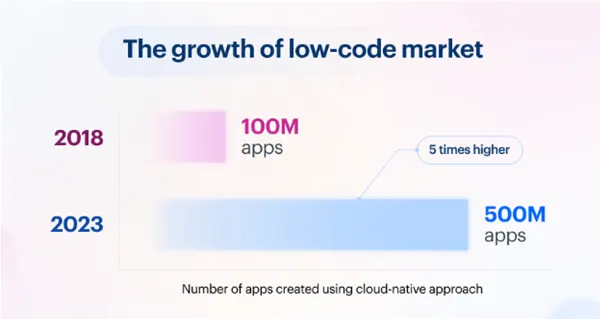
There has been an increasing digital transformation, market disruption, and agile app development worldwide. This trend is increasingly expanding the adoption of low-code software development platforms.
Low code application development tools simplify the software building process by integrating drag-and-drop objects, visual tools, and process flows.
Besides, they allow anyone to build and change applications faster, regardless of their technical capabilities. As a result, organizations can deliver new processes and app functionalities to disrupt or keep up with their markets.
Low-code and no-code platforms significantly reduce the time taken to develop mobile-optimized web apps, which is a big reason for every entrepreneur to integrate them into their businesses.
According to Creatio, companies using low-code solutions are in a position to record more growth when they simplify and automate manual processes.
In this article, we look at the five reasons to opt for a low code.
Keep Up With the Global App Development Demands
The demand for application development is growing very fast. In fact, research shows that the demand will grow more than five times faster than what the IT departments can deliver.
Low-code platforms help organizations bridge the developer shortage gap by offering quicker and less expensive programming options.
DID YOU KNOW? The market for low-code development platforms is predicted to generate $187 billion in revenue worldwide by 2030. By 2024, it will make up more than 65% of all application development activity.
Build Apps Collaboratively
Low-code platforms utilize visual models and make it easy for IT and citizen developers to collaborate without coding. Teams can easily capture the requirements on the platform, making it much easier for team members to co-build apps together.
Besides, low-code programming requires no knowledge of code. In-app updates and feedback can also be made in real time using visual language and paradigms.
Visual Workflow Management And Planning
As a visual environment, low-code platforms make it much easier for citizen developers to plan and manage workflows and processes in line with the application.
As opposed to traditional coding tools, which require high-tech coding skills and many hours of expert time, low-code platforms require no coding skills
Mobile Friendly
Entrepreneurs desire to build businesses that create an impact within and beyond the office. This way, the staff finds it easier to respond to customer queries from an ever-present clientele.
Also, low-code platforms are an excellent choice for both web and mobile applications designed with the end user in mind. Apps built with these platforms deliver seamless, high-quality visual displays on mobile UIs and are more responsive.
Scale Through Reuse
Simple apps are easy to scale to the scope of your business, easy to change, and always ready to deploy on different platforms.
Also, low-code apps can easily extend to other channels such as chatbots, mobile apps, and self-service portals.
Reuse, therefore, enhances app development productivity and consistency, making it easier for businesses to meet the expectations of end-users.
Integration With Other Apps
Low-code platforms define object models and auto-generate multi-device UIs, which make businesses link to existing applications.
Also, the platforms allow corporations to integrate with apps such as email and calendars for better workflow and data management.
This functionality is then integrated with exchange accounts so that events created on the calendar can also reflect on the exchange calendar.
As a result, business communications havens become much more accessible.

Competitors Are Using Low Code
Suppose your competitors are already implementing low-coding solutions. In that case, it is the best time to opt for the same, as the gap between these agile solutions and traditional coding solutions is so vast.
Therefore, to stay ahead of the competition, businesses must implement minimal code development.
This way, they will reduce costs, reduce coding time, and enjoy much more benefits from the automation of business, among other agile solutions.
Frequently Asked Questions
Ans: With low-code, businesses can swiftly automate processes without hiring costly, highly skilled developers.
Ans: No-code platforms usually fall short, while low-code development platforms frequently offer exceptional system integration adaptability. Because the creation of programs without proper oversight or scrutiny—shadow IT—may result from no code.
Ans: Low-code is the way of the future for many reasons, one of which is that it is comparatively simpler to learn than any other coding style. To begin, it is easy to locate guides and other materials online. Also, there are a number of online no-code/low-code platforms available to help you quickly create applications.
Ans: Low-code has the potential to significantly contribute to the broad adoption of IoT in a variety of industries by streamlining the process. Other fields with plenty of room for innovation include cybersecurity, data analysis, robotics process automation, and robotics.






